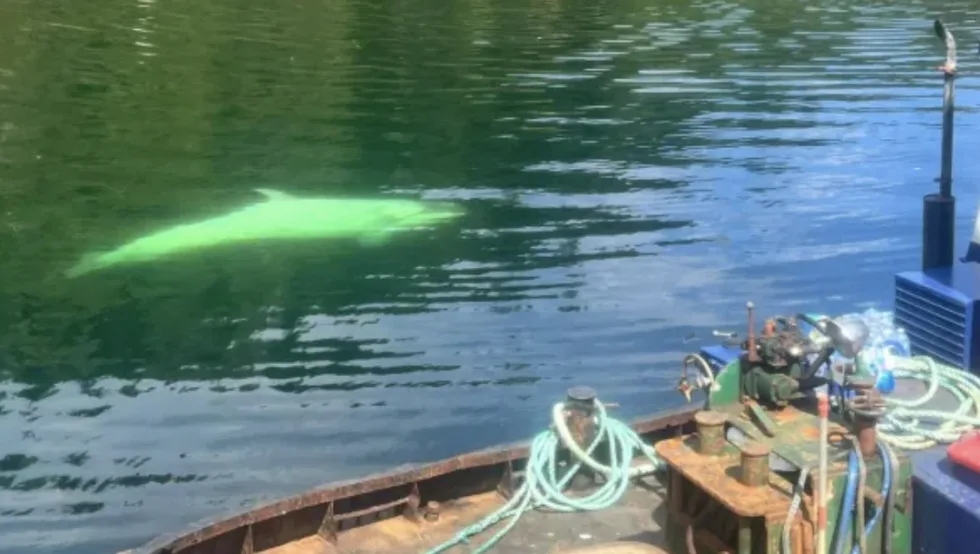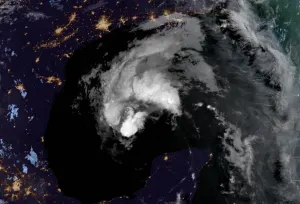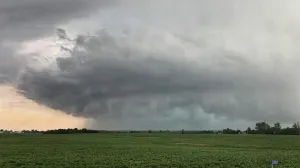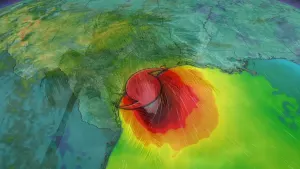
Rare white orca, named 'Frostbite', spotted off the coast of Vancouver Island
A rare white orca was spotted in the shallow waters of Beaver Cove off the coast of Vancouver Island Wednesday.
Experts say it's the first time this particular whale has been seen north of California.
Mike Dobbs was working in Beaver Cove on northern Vancouver Island when two orcas swam into the beach area a few kilometres inland from Telegraph Cove.
Dobbs said he'd never before encountered whales on that beach.

Frostbite the orca. A white orca was spotted in the shallow waters of Beaver Cove on Vancouver Island on Aug. 10, 2022. (Mike Dobbs/CBC News)
SEE ALSO: Rare Nazca booby bird sighting near Vancouver Island leaves people amazed
The Campbell River resident was even more surprised to see that one orca was completely white in colour.
"Some folks recognized the spotting around the face that it certainly had the same eye markers as an orca."
Dobbs was immediately concerned when he saw the orcas in waters as shallow as half a metre. He says their bellies were noticeably dragging on the ocean floor.
He and some other bystanders began making calls to the Vancouver Aquarium, the Department of Fisheries and Oceans and other experts to find out how to help the whales.
However, Dobbs says after about half an hour in the shallow waters, the larger orca swam back toward open waters and was followed a few minutes later by the smaller, white orca.
"She eventually kind of shimmied and wriggled herself off the seabed and made her way toward her mother."

A white orca, nicknamed Frostbite, swims with its mother in the waters of Beaver Cove on Vancouver Island on Aug. 10, 2022. (Mike Dobbs/CBC News)
DON'T MISS: Could an ancient creature be lurking in B.C.'s Okanagan Lake?
Scientists who connected with Dobbs were able to identify the white orca, known as Frostbite, and the accompanying orca as its mother.
"This particular group ... are actually part of this outer coast transient group that spends most of the time in Oregon and California and usually in deeper waters," said Josh McInness, a transient killer whale specialist at the University of British Columbia's Marine Mammal Research Unit.
He says the last sighting of Frostbite, a three-year-old, and its mother was June 24 near the Farallon Islands, off the coast of San Francisco.
Erin Gless of the Pacific Whale Watch Association says it's the first time Frostbite has been spotted north of California.
"This particular family has been seen as far south as into Mexico," she said. "[This sighting] really shows that this family, in particular, seems to have a very wide range."
The distance between the Mexico sighting in late October 2021 and Wednesday's sighting near Telegraph Cove is over 2,500 kilometres.
WATCH: 'We found micro plastics in every whale'
McInness says there's been an increase in sightings of outer coast orca groups north of the California coast, and it could be because of the abundant prey in the waters of British Columbia.
"It could be related to the increase in the seals and sea lions that we're seeing," he said.
McInness says it's not clear what causes the white colouring — it could be albino or leucistic, meaning it has white pigmentation.
Gless says there have been at least two other known white orcas — one named Tl'uk and another named Chimo that was well known in the 1970s when it was kept at Sealand. Gless says the white colouring may be a rare gene.
This article was originally published for CBC News.









